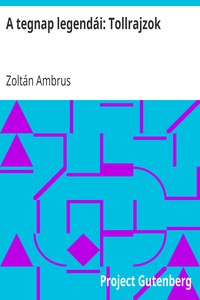A tegnap legendái: Tollrajzok by Zoltán Ambrus
"A tegnap legendái: Tollrajzok" by Zoltán Ambrus is a collection of narratives likely written in the early 20th century. This work delves into social commentary and reflections on human behavior, particularly as it pertains to death, art, and the lives of creative individuals. Central themes include the nature of fame, the existential struggles of artists, and a meditation on mortality. The opening of the collection introduces a somber scene at a funeral,
where Dr. Fontos, a prominent city figure, expresses his disdain for the extravagance and triviality he observes among the mourners. Through a dialogue among characters, Ambrus sets up a discourse on life, legacy, and the often unsavory realities of the deceased's acquaintances. The conversations reveal contrasting views on the deceased’s character, exploring themes of failure, societal judgment, and the essence of existence. As the scene unfolds, a critique of societal norms and the human condition starts to emerge, blending elements of philosophical inquiry with a vivid portrayal of social milieu. (This is an automatically generated summary.)
Read or download for free
| How to read | Url | Size | |||
|---|---|---|---|---|---|
| Read now! | https://www.gutenberg.org/ebooks/66256.html.images | 517 kB | |||
| EPUB3 (E-readers incl. Send-to-Kindle) | https://www.gutenberg.org/ebooks/66256.epub3.images | 348 kB | |||
| EPUB (older E-readers) | https://www.gutenberg.org/ebooks/66256.epub.images | 346 kB | |||
| EPUB (no images, older E-readers) | https://www.gutenberg.org/ebooks/66256.epub.noimages | 332 kB | |||
| Kindle | https://www.gutenberg.org/ebooks/66256.kf8.images | 557 kB | |||
| older Kindles | https://www.gutenberg.org/ebooks/66256.kindle.images | 500 kB | |||
| Plain Text UTF-8 | https://www.gutenberg.org/ebooks/66256.txt.utf-8 | 476 kB | |||
| Download HTML (zip) | https://www.gutenberg.org/cache/epub/66256/pg66256-h.zip | 277 kB | |||
| There may be more files related to this item. | |||||
Similar Books
About this eBook
| Author | Ambrus, Zoltán, 1861-1932 |
|---|---|
| Title | A tegnap legendái: Tollrajzok |
| Contents | Rébusz -- A szinésznő becsülete -- Novemberi hangulatok -- Emlékbeszéd -- A verejték -- A tömjén -- Pickwick ur filozófiája -- Öngyilkosság -- Szerelemből -- Temetés után -- Miszticzizmus -- Mouret abbé megtérése -- A detronizált szerelem -- Bartenyev és Vladimirov -- Két franczia -- Marabu-tollak -- Gefkin -- Abbé és markiz -- Az utolsó világos pillanat -- Miszterium a két jó pásztorról -- Képek -- Mesék a költészetről -- Téli állomások -- Az igazság -- Két szép szem és életbölcseség -- Este az erdőn -- A számüzött Télémaque -- Az érdesszavu mirakoló -- Lesseps -- Kilián király -- Szem-jonglőrök és troubadourok -- A rab mesél -- Tristia -- Koronát szerelemért -- Porcziunkula ünnepe -- Uj hivatal -- Az Orient-expressen -- Az álszakáll -- A metamorfózisokból -- Altábornagy és komornyik -- A lány-arcu veszedelem -- En revenant de la revue -- Renan szobra -- Turgenyev emléke -- A leányirtó -- Az utolsó -- Post scriptum. |
| Credits | Albert László |
| Reading Level | Reading ease score: 63.3 (8th & 9th grade). Neither easy nor difficult to read. |
| Language | Hungarian |
| LoC Class | PH: Language and Literatures: Finno-Ugrian and Basque languages and literatures |
| Subject | Hungarian literature |
| Category | Text |
| EBook-No. | 66256 |
| Release Date | Sep 10, 2021 |
| Most Recently Updated | Oct 18, 2024 |
| Copyright Status | Public domain in the USA. |
| Downloads | 222 downloads in the last 30 days. |
| Project Gutenberg eBooks are always free! | |

